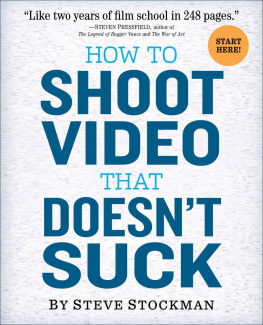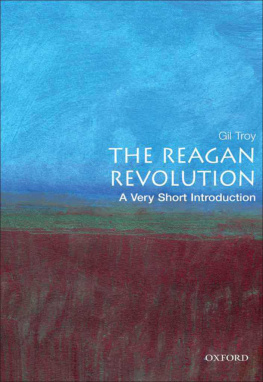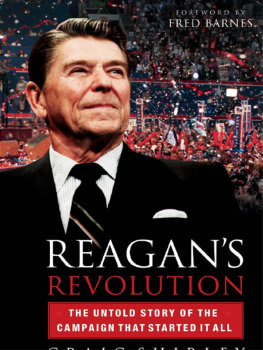THE TRIUMPH OF POLITICS
THE TRIUMPH OF
POLITICS
Why the Reagan Revolution Failed
DAVID A. STOCKMAN

PUBLICAFFAIRS
New York
Portions of this work originally appeared in somewhat different form in Newsweek.
Copyright 1986 by David A. Stockman
First published in 1986 by Harper & Row
Published in 2013 in the United States by PublicAffairs, a Member of the Perseus Books Group
All rights reserved.
No part of this book may be reproduced in any manner whatsoever without written permission except in the case of brief quotations embodied in critical articles and reviews. For information, address PublicAffairs, 250 West 57th Street, 15th Floor, New York, NY 10107.
PublicAffairs books are available at special discounts for bulk purchases in the U.S. by corporations, institutions, and other organizations. For more information, please contact the Special Markets Department at the Perseus Books Group, 2300 Chestnut Street, Suite 200, Philadelphia, PA 19103, call (800) 810-4145, ext. 5000, or e-mail .
Cataloging-in-Publication data for the hardcover edition of this book is available from the Library of Congress.
ISBN 978-1-61039-278-5 (e-book)
Library of Congress Control Number: 2012953147
For Jennifer and Rachel
CONTENTS
This book is a story about politics, so many people contributed to it in ways large and small. Because its conclusions are not equivocal, there are doubtless many who would just as soon be spared the honor of a mention.
But some are as deeply implicated as I. My colleagues at OMB and before that on Capitol HillDavid Gerson and Don Moranlived nearly every moment of the story and offered invaluable suggestions for the improvement of its telling. Ed Dale and Mike Horowitz joined me when the Reagan Revolution began and insisted that an earlier manuscript did not do justice to what actually transpired. This version may not either, but I am grateful for their critical reviews.
Dick Darman was a key participant in much of the history herein chronicled. I learned much from him as the story originally unfolded and again as I sought to recapture it in these pages.
There are many among my former colleagues in Washington who did not read the manuscript but who nevertheless decisively shaped its content. Foremost among these I count Bob Dole and Pete Domenici. I do not especially like the idea that the supply-side ideology I began with found no place in the nations politics. But the knowledge that a more conventional approach to economic governance is ably advocated by statesmen such as these is more than enough consolation.
Writing a book about budgets and numbers is enough to test the literary skills of even an accomplished writer. Chris Buckley, who knew something about the White House and even more about writing, gave me invaluable advice. Such readability as these pages may now have is in good part due to his guidance, red pencil, and the reworking of some sections that originally defied comprehension.
My editors at Harper & RowHarriet Rubin and Ed Burlingamemerit more than just gratitude. They are also due an award for patience. By normal standards this book was written quicklya characteristic more than amply evidenced by the original manuscript. Much of it found its deserved demise on the cutting-room floor, but not until they had heard me expound at length in the process of discovering that they were right. My amateurs disdain for editors has now been at least partially cured, and their efforts have made the book immeasurably better.
I would be remiss if I did not mention that Senator Daniel Patrick Moynihan also was kind enough to read the entire manuscript. He did not agree with many of my original solutions, but my conclusions he did not find nearly so stray of the mark. I have been tapping his wisdom for a long time, and the final manuscript is no exception.
Bill Greider had a lot to do with this book, including a critical and helpful review of the original draft. He was also kind enough to let me quote extensively from the transcripts of our 1981 conversations that made a big splash at the time, but had since been stacked away in his basement. I didnt like some of the things I found in them, but they were one source with which I didnt even try to argue.
Through it all, my wife, Jennifer, suffered above and beyond the call of duty. She heard every episode as it happened, and then its rendition draft after draft. She caught as many inconsistencies as anyone else involved in the project, and more fits of bad temper and frustration on my part than everyone combined. But she was unwavering in her support during all those years and through months of hectic writing. In the end that was more important than anything else.
The Presidents eyes were moist. It was unmistakablethey glistened. But while he made no effort to hide it, I had barely even noticed. My own eyes had hardly wavered from the center of my plate, from the olive atop the scoop of tuna salad. I had been trying to explain my involvement in the article in The Atlantic Monthly, and had rambled on nonstop for fifteen minutes. It seemed like forever.
The press had made it into a roaring overnight scandal. The story line made for a red-hot melodrama: The President had been cynically betrayed. I was the Judas who had disavowed the Presidents economic program and undercut his presidency.... His mettle was being tested.... I was hanging by a thread.... He was angry. Thats what the newshounds in the White House press room were braying. And they were building it up by the hour.
The reality inside the Oval Office was quite different. We were sitting at a small luncheon table in front of a crackling fire. Aside from the popping sound of the wood sap, it was quiet and serene. It was the only time I had ever been alone with him.
After the White House stewards had served soup and tuna salad, the President turned to the business at hand. Dave, how do you explain this? he said softly. You have hurt me. Why?
My explanation soon meandered off into a total digression. It amounted to a capsule of my life story....
I had grown up in a small midwestern town as he had. My grandfather had taught me the truths of Christianity and Republicanism. Id been thrilled by Ronald Reagans clarion call to conservatives at the 1964 Republican Convention.
But then I had gone off to college and fallen into the clutches of campus radicalism. Like many in my generation, I took up Marxism and America-hating. Liberal professors and anti-war agitators shattered everything I believed in.
When the radicals turned violent, however, I finally saw the light. Just as he had stood up to them as governor of California, I had, too. Slowly I discovered that the left was inherently totalitarian.
Step by step I then worked my way back to where I had started. I rediscovered the virtues of unfettered capitalism, the dangers of Soviet communism, and the promise and ideals of American democracy.
For ten years I labored in the vineyards of Capitol Hillfirst as a staff member, then as a congressman. I worked hard and long to learn everything there was to know about the behemoth called the federal government. In digging into the details of its vast expanse of programs, regulations, and bureaucracy, I discovered that it was riddled with waste, excess, and injustice. I came to believe that Ronald Reagan had been right all along.
Next page








